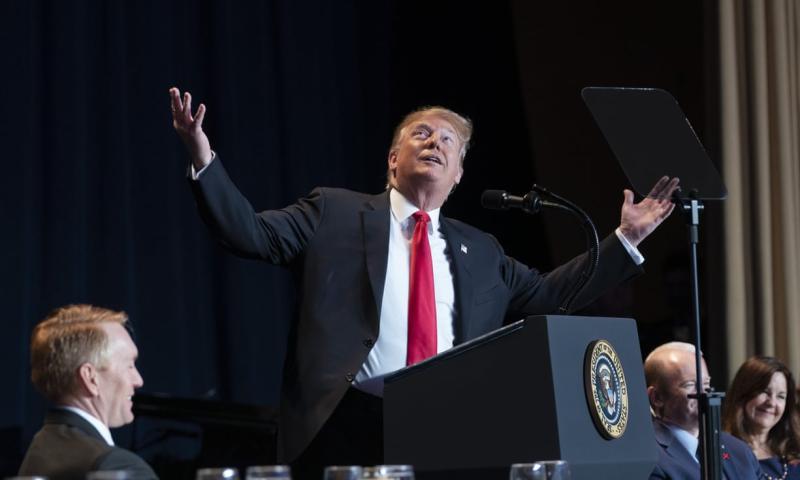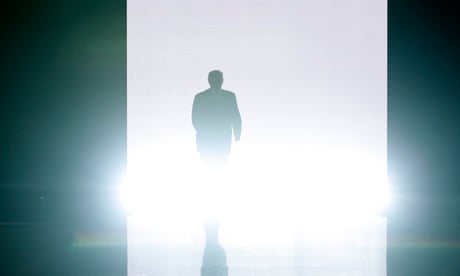Opinion Donald Trump In revering Trump, the religious right has laid bare its hypocrisy



he annual anachronism known as the National Prayer Breakfast attracted its usual array of clergy, military, and political leaders in Washington on 7 February. Most prominent of all, of course, was Donald Trump , who used the de facto pulpit to call for outlawing abortion, among other positions dear to the Religious Right.
Yet the presidential comment that most typified all that has gone morally haywire with the supposedly moral majority came when Trump praised the “abolition of civil rights”. You can consider that statement an innocent, if embarrassing, misreading of the Teleprompter. Or you can hear it as a Freudian slip.
As inspired by the Reverend Billy Graham and originated by President Dwight Eisenhower in 1953, the National Prayer Breakfast served two consensual, almost anodyne purposes. It epitomized the moderate, mid-century civil religion that preached that an American was a better citizen for believing in God and going, at least occasionally, to church or synagogue. And amid the Cold War, American leaders insistently portrayed their nation’s collective faith confronting what was routinely called “godless Communism”.
In fact, the greatest application of religion in the public square during the 1950s and 1960s occurred in pursuit of a liberal goal: civil rights. Like the abolitionists of the 19th century, civil rights leaders such as the Reverend Dr Martin Luther King Jr wielded the Bible and its concept of all humanity being formed in the divine image as an argument for racial equality.
Eisenhower and King and the versions of American religion they embodied look like quaint relics now. The National Prayer Breakfast, with Trump preaching to his intolerant choir, attests to the denigration of evangelical Christianity as anything except a cynical political movement. No amount of bipartisan window-dressing – Democratic senator Chris Coons as a co-sponsor of this year’s event, House Speaker Nancy Pelosi was in attendance – can undo the damage that the religious right has done to itself.
It is hardly necessary here to reiterate the myriad sins that Trump has openly committed or the blithe ignorance of scripture he betrayed during the presidential campaign. All that matters is that more than 80% of white evangelicals conveniently forgot their prior concern with presidential character to vote for Trump, and this faction has remained his most loyal base.
For his part, as we know, Trump has delivered the goods: two anti-abortion justices appointed to the supreme court, a ban on transgender people in the military, removal of a tax-code provision that barred religious institutions from explicitly endorsing political candidates.
In order to square the particular circle of how a serial adulterer, casino mogul, and all-purpose bigot can be deserving of their support, pious Christians have concocted a brand-new theological work-around. It depicts Trump as the modern-day King Cyrus, the pagan monarch of ancient Persia who allowed the Jewish captives of Babylon to return to their holy land.
Presidential press secretary Sarah Huckabee Sanders – lest we forget, the daughter of the minister-politician Mike Huckabee – succinctly explained that God “wanted Donald Trump to become president”.
From the perspective of Democrats and progressives, the impregnable evangelical fortress around Trump can look like a problem. As proven electoral activists and bloc voters, evangelicals exert disproportionate power. Certainly, they will make sure that any Republican-primary challenger to Trump is defeated. And in another close general election, they hold huge balloting power in such swing states as Georgia, Florida, North Carolina, Iowa, and Michigan.
Instead, though, Americans of the center and left ought to feel liberated by the religious right’s embrace of Trump. It has broken a spell.
In a way that secular or less-observant people are reluctant to admit, they often feel inadequate to the task of arguing politics, much less religion, with fundamentalists. Few of us know the relevant texts or theologies, and even if we do, we default to the faulty premise that religion shouldn’t be part of political decision-making. (Which would have come as a shock to King, for one.)
Under King Cyrus Trump, however, the religious right has laid bare its hypocrisy, and indeed its heresy. We can feel emboldened to fight our opponents like any other political movement rather than as devout believers whose direct line to the Almighty, and whose resulting presumption of moral superiority, we have no way of empirically disproving.
In time, perhaps, white evangelicals will recover some of their ethical and religious moorings. A younger generation of such evangelicals is making its way through high school and college now, and registering its disgust with Trumpian Christianity, even at Jerry Falwell Jr’s Liberty University.
Among the older generation, at least a few believers of principle, such as former George W Bush staffers Michael Gerson and Peter Wehner, have eloquently decried the evangelical movement’s self-inflicted wounds.
Until some larger-scale period of penance comes for white evangelicals, anyone familiar with Judeo-Christian history might offer an alternative precursor to Trump than King Cyrus. My own nomination would be a 17th-century Turkish Jew named Shabbetai Zevi, who p ronounced himself the Messiah.
For some subsequent years, there were Jews who actually believed him, so great was their despair at persecution and dispersal. Then, abruptly, their messiah converted to Islam. When scholars today look back at Shabbetai Zevi, they assess him most charitably as a madman, and less generously, as a



